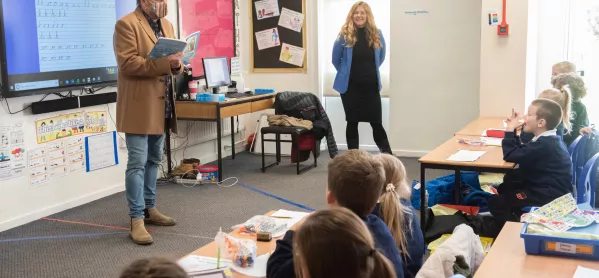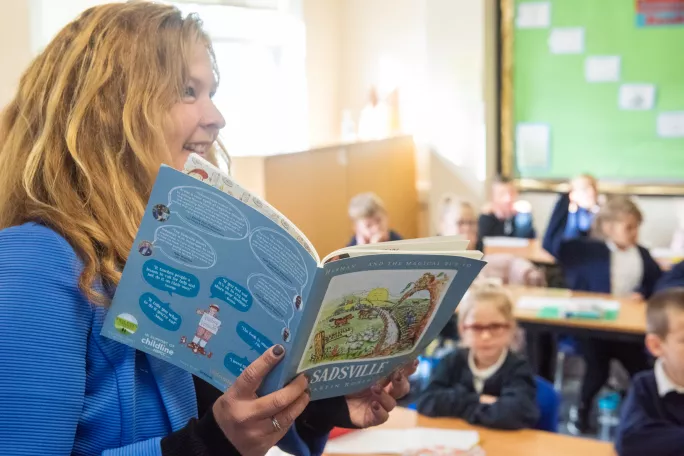The book being sent to all 22,500 primary schools

All 22,500 primary schools in the UK will receive two free copies of the latest children’s book written by Homes Under the Hammer presenter Martin Roberts, entitled Sadsville.
The book has been written specifically to help young children understand and make sense of any confusing, upsetting or challenging emotions they may feel, especially during 2020 and the challenges of lockdown, remote schooling and potentially tough times at home.
The books being sent will contain teaching materials, resources and a lesson plan to help teachers use the books to guide pupils in understanding their own emotions, why they may be struggling with unhappiness, ways to feel happier, and finding support if required.
A further 4,000 copies will also be sent to all public libraries in the UK.
Child mental health: understanding emotions
Roberts said that the aim is for the book and its teaching guides to help teachers broach conversations on wellbeing and emotions in a relatable, engaging and sensitive way.
“Teachers are having to spend a lot of time focusing on the core subjects of English, maths and science, so we wanted them to have access to a ready-made set of resources and a book that can help them talk about these topics and help flag up any children who may be struggling,” he said.
“Of course, most children are really resilient and will be fine, but for those who aren’t, even if it’s just one in a class, the book can help them talk about that and open up discussions so teachers can spot children who may be struggling.”
A huge effort
To ensure that the book would be received by all schools, Roberts and volunteers for his foundation had to track down the addresses of all 22,500 primary schools in the UK and 4,000 public libraries. They also emailed every school twice to inform them the book would be arriving.
“It was an unbelievably massive job,” he says.
The cost of the printing and distribution has been covered by a packaging firm in Swindon called Wasdell Group, which heard about the initiative from Roberts.
Roberts helped to mark the launch of the book today by doing a reading at Paulton Junior School in Bristol (pictured above) with PSHE lead Jo Chapman (below).
NSPCC support
The book has been produced with the backing of the NSPCC and it directs children to its Childline resource if they have any concerns they wish to raise outside of school or at home.
Peter Wanless, CEO of the NSPCC, said that getting the book into every school and providing resources for teachers to use it was a fantastic way to ensure that more children could understand any confusing emotions they felt and how to deal with them.
“At Childline we have heard from thousands of young people about how the combination of the lockdown, the closure of schools and the lack of contact with friends and family has impacted on their mental health.
“The Sadsville book’s message is so important. No child should have to cope alone, and Childline is here for them. I’m sure it will mean more young people know where to turn to for help.”

Celebrity chums
Distributing the book to all schools was a goal Roberts had in mind earlier in the year when he released a video of Basil Brush reading the book on YouTube to help provide a means for teachers to share the resource with children during lockdown.
This time around he has not only recruited Basil Brush once again but also a host of other celebrities including David Hasselhoff, Bruno Tonioli, Jeremy Vine, Kimberley Wyatt and Esther Rantzen to read short passages of the book. You can watch the video below.
Looking to the future, Roberts is still hoping to find a way of providing every eight- and nine-year-old child with a copy of the book.
“That’s the age where the NSPCC says it’s key to get in there and talk to children about these things, rather than picking up the pieces afterwards, so we still have that goal in mind. But for now we’re just doing what we can as we go,” he said.
Dan Worth is senior editor at Tes
You need a Tes subscription to read this article
Subscribe now to read this article and get other subscriber-only content:
- Unlimited access to all Tes magazine content
- Exclusive subscriber-only stories
- Award-winning email newsletters
Already a subscriber? Log in
You need a subscription to read this article
Subscribe now to read this article and get other subscriber-only content, including:
- Unlimited access to all Tes magazine content
- Exclusive subscriber-only stories
- Award-winning email newsletters